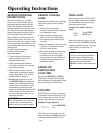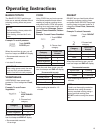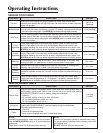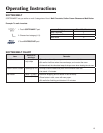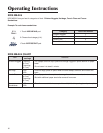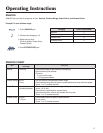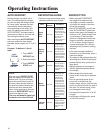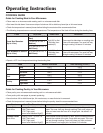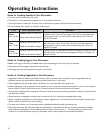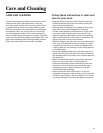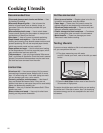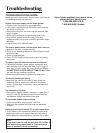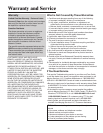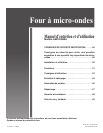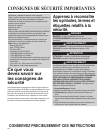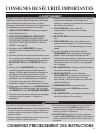
20
Operating Instructions
Guide for Cooking Seafood in Your Microwave
• Cook fish until it flakes easily with a fork.
• Place fish on a microwave-safe roasting rack in a microwave-safe dish.
• Use a tight cover to steam fish. A lighter cover of wax paper or paper towel provides less steaming.
• Do not overcook fish; check it at minimum cooking time.
Food Cook Time/Power Level Directions
Steaks
Up to 1.5 lbs.
Cooking Time: 7-11 min. / lb.
Power Level: Medium-High(7)
Arrange steaks on roasting rack with meaty portions towards the
outside of rack. Cover with wax paper. Turn over and rearrange when
cooking time is half up. Cook until fish flakes easily with a fork. Let
stand 3-5 minutes.
Fillets
Up to 1.5 lbs.
Cooking Time: 4-8 min. / lb.
Power Level:Medium-High(7)
Arrange fillets in a baking dish, turning any thin pieces under. Cover
with wax paper. If over ½ inch thick, turn over and rearrange when
cooking time is half up. Cook until fish flakes easily with a fork. Let
stand 2-3 minutes.
Shrimp
Up to 1.5 lbs.
Cooking Time: 4-6 ½ min. / lb.
Power Level: Medium-High(7).
Arrange shrimp in a baking dish without overlapping or layering. Cover
with wax paper. Cook until firm and opaque, stirring 2 or 3 times. Let
stand 5 minutes.
Guide for Cooking Eggs in Your Microwave
• Never cook eggs in the shell, and never warm hard-cooked eggs in the shell; they can explode.
• Always pierce whole eggs to keep them from bursting.
• Cook eggs just until set; they become tough if overcooked.
Guide for Cooking Vegetables in Your Microwave
• Vegetables should be washed just before cooking. Often, no extra water is needed. If dense vegetables such as
potatoes, carrots and green beans are being cooked, add about ¼ cup water.
• Small vegetables (sliced carrots, peas, lima beans, etc.) will cook faster than larger ones.
• Whole vegetables, such as potatoes, acorn squash or corn on the cob, should be arranged in a circle on the turntable
before cooking. They will cook more evenly if turned over after half the cooking time has passed.
• Always place vegetables like asparagus and broccoli with the stem ends pointing towards the edge of the dish and the
tips toward the center.
• When cooking cut vegetables, always cover the dish with a lid or vented microwavable plastic wrap.
• Whole, unpeeled vegetables such as potatoes, squash, eggplant, etc., should have their skin pricked in several spots
before cooking to prevent them from bursting.
• For more even cooking, stir or rearrange whole vegetables halfway through the cooking time.
• Generally, the denser the food, the longer the standing time. (Standing time refers to the time necessary for dense,
large foods and vegetables to finish cooking after they come out of the oven.) A baked potato can stand on the
counter for five minutes before cooking is completed, while a dish of peas can be served immediately.



